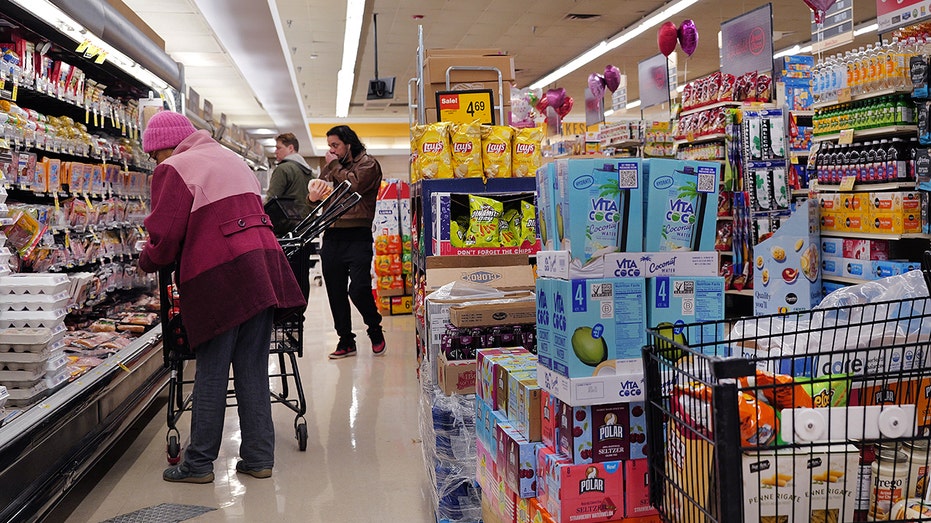Inflation accelerates more than expected in March as high prices persist
Inflation rises faster than expected for third straight month
March inflation data will 'be very important' for the Fed: WSJ reporter
The Wall Street Journal chief economics correspondent Nick Timiraos says the central bank needs 'credible justification' for beginning rate cuts.
Inflation accelerated in March for the third straight month, keeping prices painfully high for millions of Americans and likely delaying any interest rate cuts by the Federal Reserve.
The Labor Department said Wednesday that the consumer price index, a broad measure of the price of everyday goods including gasoline, groceries and rent, rose 0.4% in March from the previous month. Prices climbed 3.5% from the same time last year, above the 3.2% figure recorded in February.
Both of those figures came in higher than the 0.3% monthly increase and 3.2% headline gain forecast by LSEG economists.
Other parts of the report also pointed to stubborn price pressures within the economy. Core prices, which exclude the more volatile measurements of food and energy, climbed 0.4%, as they did in January and February, for an annual gain of 3.8%. Those figures are also higher than estimates.
JAMIE DIMON WARNS INFLATION, INTEREST RATES MAY REMAIN ELEVATED
Altogether, the report indicates that while inflation has fallen considerably from a peak of 9.1%, it remains well above the Federal Reserve's 2% target.
"This marks the third consecutive strong reading and means that the stalled disinflationary narrative can no longer be called a blip," said Seema Shah, chief global strategist at Principal Asset Management.
High inflation has created severe financial pressures for most U.S. households, which are forced to pay more for everyday necessities like food and rent. The burden is disproportionately borne by low-income Americans, whose already-stretched paychecks are heavily affected by price fluctuations.
WHY ARE GROCERIES STILL SO EXPENSIVE?
Housing and gasoline costs were the biggest drivers of inflation last month, accounting for more than half of the total monthly increase.
Rent costs rose 0.5% for the month and are up 5.7% from the same time last year. Rising rents are concerning because higher housing costs most directly and acutely affect household budgets. Gasoline prices, meanwhile, jumped 1.7% over the course of March. They are up 1.3% when compared with the same time last year.

Customers shop at a grocery store in Chicago on Feb. 13. (Scott Olson/Getty Images / Getty Images)
Other price gains also proved persistent in March.
Food prices, a visceral reminder of inflation for many Americans, ticked up 0.1% over the course of the month. In total, the cost of groceries is up 1.2% from the same time last year and up a stunning 21% when compared with January 2021, shortly before the inflation crisis began.
"This was a painful report with few bright spots for consumers," said Robert Frick, a corporate economist with Navy Federal Credit Union.
| Ticker | Security | Last | Change | Change % |
|---|---|---|---|---|
| I:DJI | DOW JONES AVERAGES | 49395.16 | -267.50 | -0.54% |
| I:COMP | NASDAQ COMPOSITE INDEX | 22682.729157 | -70.91 | -0.31% |
| SP500 | S&P 500 | 6861.89 | -19.42 | -0.28% |
The report comes as Federal Reserve policymakers weigh when to start cutting interest rates amid concerns that progress on inflation has stalled. Investors have steadily dialed back their expectations as central bank officials signal they are in no rush to cut, and that incoming economic data will guide their decision.
Multiple Fed officials have cast doubts in recent days on the prospect of three rate cuts this year. Fed Governor Michelle Bowman said last week that she still sees "upside risks" to inflation, while Atlanta Fed President Raphael Bostic said he sees just one rate in 2024, likely not until the fourth quarter.
Stock futures tumbled Wednesday morning as the surprisingly hot inflation data dashed investor hopes that the Fed would start cutting rates as soon as June. Market pricing now indicates the first interest rate cut will come in July, according to the CME Group's FedWatch tool.
GET FOX BUSINESS ON THE GO BY CLICKING HERE
"In fact, even if inflation were to cool next month to a more comfortable reading, there is likely sufficient caution within the Fed now to mean that a July cut may also be a stretch, by which point the U.S. election will begin to intrude with Fed decision-making," Shah said.





















